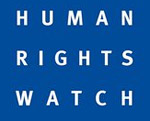Yesterday the prominent Human Rights Watch international organization issued its annual report of 2008, which grants quite a space to the events, which took place in Armenia in the last year.
The experts of the mentioned organization stated that since its independence Armenia abode the deepest political and civic crisis in 2008. “The February 19 presidential election was won by Prime Minister Serzh Sargsyan, but was marred by election-day violence and irregularities. On election day, assailants threatened and attacked opposition activists protesting what they believed to be electoral fraud, domestic observers, and journalists at eight polling stations. Several assaults occurred in the presence of police and election officials who did not intervene; in one case a policeman appeared to assist assailants. International observers also reported violations, including campaigning near polling stations, ballot stuffing, vote buying, and counting and tabulation irregularities. Observers criticized the Central Election Commission for its apparent failure to properly investigate complaints.” As of the postelection clashes the Human Rights Watch writes, “On February 20, tens of thousands of supporters of Levon Ter-Petrosyan, the main opposition candidate, took to the streets in downtown Yerevan. The protests continued peacefully for 10 days. On March 1, special police forces confronted the demonstrators using excessive force, beating them with batons and attacking fleeing demonstrators. Some demonstrators also resorted to violence, including throwing stones and burning vehicles. The clashes resulted in at least 10 deaths (eight demonstrators and two police officers), and scores of people were injured. Police detained several hundred demonstrators, charging more than one hundred opposition supporters and others with organizing or participating in illegal demonstrations and mass disturbances. Police committed due process violations including incommunicado detention, denial of access to counsel, and failure to investigate allegations of ill-treatment. Subsequent trial proceedings raised fair trial concerns: several detainees were convicted solely on police testimony and in expedited trial proceedings. The government declared a state of emergency on March 1, temporarily restricting freedom of movement, assembly, expression, and access to information. The state of emergency was lifted fully on March 21. Under pressure from the Parliamentary Assembly of the Council of Europe (PACE), the Armenian authorities have taken steps to establish an independent inquiry into the March 1 events, but have yet to hold anyone responsible for the deaths.” As of media freedom the report reads, “Police targeted journalists covering the February demonstrations. On February 29, police attacked photojournalist Gagik Shamshyan while he was attempting to photograph them. On March 1, police detained Shamshyan, took his camera, and beat him; he needed hospital treatment for his injuries and was released after the intervention of the Armenian ombudsman. Also on March 1, police hindered a Radio Liberty correspondent’s work and beat the driver of her car. Police detained at least two other journalists during demonstrations in Yerevan and Gyumri. Under the state of emergency, media could use only official information from state agencies to report on national affairs. The National Security Service (NSS) prevented at least seven opposition and independent newspapers from publishing, and blocked websites. At least two newspapers protested the restrictions and refused to print. Although media restrictions were lifted on March 13, NSS representatives interfered with the same seven newspapers’ printing, allowing them to publish only on March 21. On January 19, an assailant attempted to set fire to the Asparez office, and on March 21 two unidentified men torched a car being used by Asparez director Levon Barseghyan as he returned to the car from GALA.” In June 2008 the European Court of Human Rights ruled that Armenia had violated article 10 (freedom of expression) of the European Convention on Human Rights in relation to the independent broadcast company A1+. The Yerevan Press Club reported several apparently arbitrary arrests of journalists, and the beating of two journalists, Lusine Barseghyan, an Armenian Times reporter, and Hrach Melkumyan, Radio Liberty acting director, by unknown assailants in separate incidents in August. The journalists believe they were targeted for their professional activities. Just before the government lifted the state of emergency, on March 17, 2008, the National Assembly passed restrictive amendments to the law on meetings, which were criticized by the Council of Europe and the Organization for Security and Co-operation in Europe (OSCE). Subsequent further amendments in April eased some of the restrictions. The government denied numerous opposition requests to hold public rallies in late March, and at least 90 people participating in peaceful "public walks" organized by opposition supporters in Yerevan were briefly detained. According to local human rights defenders, torture and ill-treatment in custody remain widespread. Several people detained in connection with the March 1 events alleged physical abuse during apprehension, transfer to police stations, and in custody. At this writing, the authorities have not investigated these claims. At the end of the report the Human Rights Watch writes, “International election observers from the OSCE, Council of Europe, and the European Parliament declared that the February elections were "mostly in line" with international standards, but noted concerns about the election process. International and domestic observers also criticized uneven media coverage of candidates prior to the elections. Citing concerns about the Armenian authorities’ reaction to the March 1 events, the United States froze further payments to Armenia from the Millennium Challenge Corporation.”

